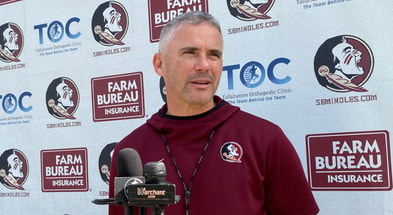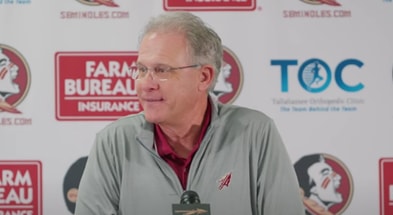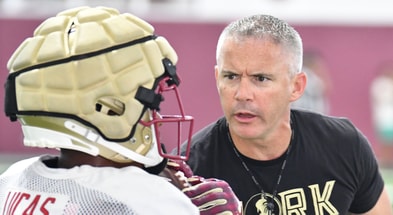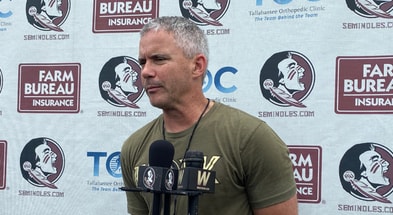FSU takes aim at former ACC Commissioner John Swofford in amended complaint

Nearly two weeks after the Atlantic Coast Conference raised the stakes in its legal battle with Florida State University by filing an amended complaint in North Carolina Superior Court, the Seminoles fired back with a return volley Monday evening.
And it was a scorcher.
In a 59-page amended complaint for declaratory judgment — 21 pages longer than the original complaint Florida State filed in December — the university took sharp aim at former ACC Commissioner John Swofford for a number of allegedly self-serving actions it says cost member schools millions upon millions of dollars. FSU’s attorneys also rebutted several claims from, and questioned the legality of, the ACC’s complaint.
*VIEW FSU AMENDED COMPLAINT IN FULL*
The new Florida State filing was submitted to Leon County Circuit Court Monday evening, and it was later obtained by Warchant.com. It is part of an ongoing dispute in which FSU is seeking an easier potential path out of the conference, instead of paying over $500 million in exit fees and penalties.
While huge swaths of the original complaint are unchanged, it doesn’t take long to sense a more combative tone and an effort to put Swofford in the crosshairs this time around. In the second paragraph of the “Introduction,” FSU accuses the Atlantic Coast Conference of, “chronic fiduciary mismanagement, bad faith and self-dealing.”
The phrase “self-dealing” was not in the initial complaint.
That allegation, which is raised repeatedly throughout the document, suggests that Swofford for years was acting in the best interests of his son, and his son’s employment with ACC television partner Raycom Sports, over the needs of the conference and its member schools.
The complaint contends that ACC schools have lost $82 million each year in revenue from their Tier II and Tier III media rights as a result of the conference’s sweetheart deal with Raycom, a regional sports network in Charlotte, N.C. (Tier II and Tier III rights typically refer to sporting events that are regional in interest, and not the types of marquee matchups desired by national networks.)
According to the new filing, Chad Swofford was director of business development at Raycom Sports in 2008 when the Southeastern Conference sold all of its media rights to ESPN, cutting Raycom out of the deal for the first time in over two decades. A Sports Business Journal article cited in the complaint stated that 20 Raycom employees were laid off as a result of the deal.
“Though just recently employed by Raycom Sports, Chad Swofford was spared in the employee cut,” the complaint states, noting that roughly 80 percent of the media outfit’s revenues were coming from the ACC at that time.
And when the conference’s media rights came up for bid on the open market in 2010, Florida State alleges, John Swofford made it clear to ESPN and FOX that Raycom needed to be involved in the package.
“When the smoke cleared, with the ACC members’ Tier II and Tier III media rights as barter, Swofford cajoled ESPN into entering into a separate ‘sublicensing arrangement’ with Raycom Sports under which ESPN sublicensed to Raycom Sports a package of content in exchange for which Raycom paid to ESPN a reported $50 million a year,” according to the complaint.
“The Raycom Sports Partnership has cost each ACC member several million dollars and continues to depress the value of their media rights, and the cost and success of their prestige network through today. The ACC members saw no part of the payment Raycom Sports made to ESPN for their media rights, which if divided among the then 15 members would exceed $3 million per member.”
Florida State’s amended complaint also provides fresh examples of the ACC’s failure to keep up financially with other college conferences, beyond even the SEC and Big Ten.
A Forbes article about the ACC’s 2012 ESPN deal featured the headline, “Did ACC teams get ripped off with new ESPN TV contract?” It pointed out that Big 12 schools were each making $3 million more per year than those in the ACC. And a Sports Business Journal article around the same time claimed the conference’s new deal was already “outdated” because the Pac-12 had just signed a bigger contract with FOX.
A subsequent Forbes article stated, “The ACC is giving away more [rights than the Big 12] and getting less. … When the ACC signed its previous ESPN contract a few years ago, Swofford insisted on maintaining a partnership with syndicator Raycom Sports, possibly giving away increased media rights revenues in the process.”
According to the complaint, Chad Swofford was promoted to Senior Director, New Media and Business Development at Raycom in June 2012. He would be promoted again to vice president and general manager of ACC Digital in 2015.
Other topics revisited and expanded in the new filing are related to ESPN’s delays in launching the ACC Network, which are at least partially attributed to the Raycom deal. There also are additional complaints about Swofford’s ineffective TV negotiations, which allegedly cost the member schools millions.
Interestingly, Swofford’s name now appears multiple times in the complaint where “ACC” was used in the first filing. The changes reflect that it was specifically the then-commissioner who “feigned” an ESPN ultimatum that the cable channel would not be launched if schools didn’t sign off on an extended Grant of Rights.
“Swofford now represented to the members that ESPN had issued an ultimatum: unless each ACC member executed an extension of the ACC GofR for a full nine years beyond the then-expiration date, from 2027 to 2036, ESPN would enter into no further media rights agreements with the ACC, meaning there would be no prestige network for the ACC launched by ESPN,” the complaint states.

There also are new claims that ACC schools had to spend a combined $110 million to $120 million to prepare to produce live programming for their conference network in 2019 — four times what SEC schools spent when their network was launched in 2014. That information was cited from a report in the Sports Business Journal.
Top 10
- 1New
Mark Pope
Receives raise, extension
- 2Hot
QB Mock Draft
Predicting landing spots for Top 12
- 3Trending
Pat McAfee
Host talks Mary Kate Cornett lawsuit
- 4
Mike Elko
Shreds player over motto
- 5
Isaiah Augustave
CU RB not with program
Get the On3 Top 10 to your inbox every morning
By clicking "Subscribe to Newsletter", I agree to On3's Privacy Notice, Terms, and use of my personal information described therein.
Toward the end of the new filing, Florida State disputes the ACC’s Jan. 16 amended complaint seeking damages based on six claims, including that FSU breached its contract with the ACC, breached confidentiality in the media rights agreement, and breached fiduciary obligations and obligations of good faith.
“Neither the Florida State Board of Trustees nor Florida State have ever been asked by either the ACC or ESPN to sign any sort of confidentiality or nondisclosure agreement. And no such agreement exists,” the complaint states, adding that there are no mentions of “confidentiality or trade secrets” in the Grant of Rights or the GOR extension.
To the contrary, FSU’s attorneys argue, Florida’s Constitution requires that all of these ACC media-related documents be deemed public records.
“There is no provision in Florida law by which the Florida State Board of Trustees or Florida State is authorized to waive the applicability of Florida’s Public Records Act,” the new complaint states.
FSU also notes that Florida Attorney General Ashley Moody has informed the ACC that the Grant of Rights and other agreements between the conference and ESPN are “property of a public university” and should be turned over to her office.
SIGN UP: Join Warchant’s FSU Community for $1 today
The final new portion of Florida State’s amended complaint focuses on the ACC’s “unprovoked lawsuit” against the university, which was filed one day before the FSU Board of Trustees voted to file a complaint against the conference.
Along with pointing out that the ACC took it upon itself to make many of the conference’s financial agreements “public” by filing a complaint against a member school, Florida State also contends that the conference didn’t follow the necessary steps to take legal action.
The Seminoles say the ACC Constitution requires the conference give notice of a meeting of its board and then secure a two-thirds majority vote before the, “initiation of any material litigation involving the conference.
“Nowhere in either of the two complaints the ACC has now filed in the Unprovoked ACC Lawsuit does the ACC purport to have complied with this mandatory precondition or purport to assert that its members had prior notice of the lawsuit.”
As part of its original lawsuit, Florida State is asking the circuit court to rule that the Grant of Rights, which could cost the university approximately $442 million in media rights and broadcast fees over the next 13 years if FSU leaves the ACC, is unenforceable under Florida law.
The university also is arguing that the ACC’s exit fee of $130 million is punitive and, when combined with the GOR penalty, “grossly excessive.”
Florida State officials have not formally asked to leave the conference, but this is believed to be the first step as the Seminoles and other ACC schools face a massive revenue gap with schools in the Big Ten and SEC. Projections show schools in those leagues making $30 million to $40 million more than ACC schools, per year, in the near future.
Talk about this story with other die-hard Florida State football fans on the Tribal Council.
























